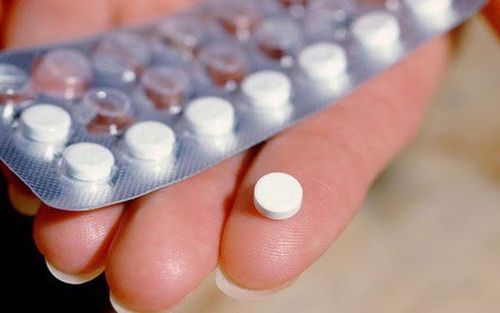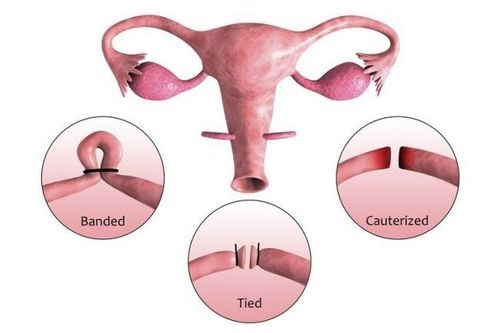This is an automatically translated article.
Once you have decided the right time to have a baby, and have used birth control before, you may be worried whether birth control will affect your ability to get pregnant. In some cases, it may take longer than usual to conceive after stopping the birth control method. But in the long run, there's no negative effect of any contraceptive use on your fertility.
1. When should you stop using birth control?
You should not stop using birth control until you are ready to become pregnant. It doesn't take the body time to get rid of all the hormones that control birth control. In fact, you can get pregnant after you stop taking birth control pills. However, if you want to stop using hormonal birth control but don't want to get pregnant right away, it's best to choose another method, such as condoms, until you're ready.
2. How long does it take to get pregnant?
Many women often worry and ask the question, how long will it take to ovulate and get pregnant if you stop taking birth control pills? In fact, if you're using a barrier method such as a condom or diaphragm, you can get pregnant very soon after you have unprotected sex. Most women can get pregnant a few months after starting to stop hormonal birth control, such as the pill, patch, or intrauterine device (IUD). But health factors, including lifestyle habits and genetics, also play a role in how long a pregnancy lasts.
2.1 Birth control pills You can get pregnant as soon as you stop using combination pills, which are pills that have estrogen and progestin. But most women will be able to get pregnant within a year of stopping birth control pills. One study even showed that women who used the pill for more than 4 or 5 years were more likely to conceive than those who took it for 2 years or less.
If you are taking progestin-only pills, you may get pregnant a few days or weeks after stopping the pill. That's because these drugs don't continuously prevent ovulation like drugs with active estrogen. Instead, it works to thin the lining of your uterus. This lining begins to thicken again soon after these drugs are stopped.

Bạn có thể mang thai sau ngừng uống thuốc tránh thai
2.2 Intrauterine device (IUD) You may be able to get pregnant as soon as your doctor removes the IUD. Women will usually start ovulating within 1 month of having the IUD removed. For most women, pregnancy can be achieved within 6 months to a year.
2.3 Implants Just like the IUD, you can get pregnant as soon as your doctor removes the implant. Most women begin to ovulate again within the first month.
If you use the birth control patch, you will start ovulating 1-3 months after you stop using it. This does not guarantee that you will get pregnant, but you will be ovulating to conceive.
2.4 Vaginal ring Most women will ovulate 1-3 months after the vaginal ring is removed.
2.5 Injectable Birth Control Pills (Depo-Provera) Unlike other hormonal birth control methods, it may be harder for you to get pregnant after you stop using these medications. It may take 10 months or longer before you ovulate again. For some women, it can take up to 18 months for periods to start again. That's why experts generally don't recommend this method for women who want to have a baby within a year of using birth control.
3. Is it safe to get pregnant right after you use birth control?
If you are too worried about the case, it's always okay to just stop taking birth control pills, then the answer is no problem. Experts used to think that women were at a higher risk of miscarriage if they became pregnant soon after stopping birth control. But newer research shows that it's completely normal to get pregnant after stopping birth control and has no effect on the mother or baby.

Hãy tham vấn bác sĩ về tình trạng mang thai sau ngừng uống thuốc tránh thai
4. How do I know I'm ovulating?
The surest way to know is to try ovulation. Your healthcare provider will test your urine for luteinizing hormone (LH) levels, which rise 24 to 36 hours before you ovulate.
Your body may also show signs that you are ovulating or about to ovulate. For example, basal body temperature rises slightly around the time of ovulation. The mucus that comes from the cervix can become sticky or feel like raw egg whites.
5. What if you can't seem to get pregnant?
You should talk to your doctor about pregnancy before you start trying. While most women conceive within a year of trying, there are various factors - like age, health history and weight - that can affect your fertility. If you're under 35 years old and it's been more than a year since you stopped using birth control and still haven't been able to get pregnant, you should let your doctor know. If you are 35 or older, you should see your doctor after 6 months of trying. An OB-GYN with experience in women's health or a fertility specialist can evaluate you and make recommendations that may increase your chances of getting pregnant.
With the sharing of pregnancy problems after stopping taking birth control pills, we hope to help you better understand, thereby making plans and considerations about your future pregnancy goals.
Besides, in case you have stopped contraception for a while but have not become pregnant again, you can go to Vinmec International General Hospital to be examined by a team of qualified doctors. The examination process will help you know your health status, promptly treat and prevent the risk of diseases if any, supplement the necessary nutrients, create the best conditions for the fetus to develop. Right from the time of pregnancy, it helps to identify genetic-related risk factors, especially in cases where the parents are suffering from obstetric and gynecological diseases, chronic diseases, have been pregnant or gave birth to a child. have birth defects. In particular, Vinmec has Vinmec Fertility Support Center, the leading modern center in Vietnam, built and applied a treatment process that combines comprehensive examination, combining both male and female obstetrics and gynecology to provide the optimal solution for each customer case.
Please dial HOTLINE for more information or register for an appointment HERE. Download MyVinmec app to make appointments faster and to manage your bookings easily.
Reference source: healthline.com - webmd.com












